#The 100 Greatest Songs in the History of Korean Pop Music
Text
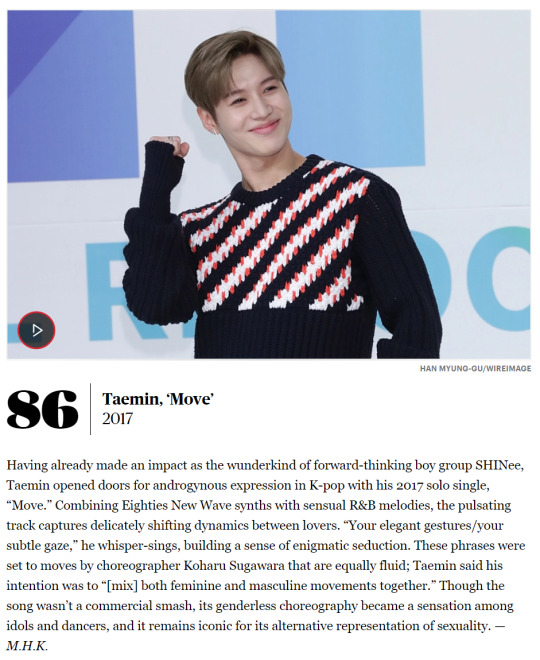
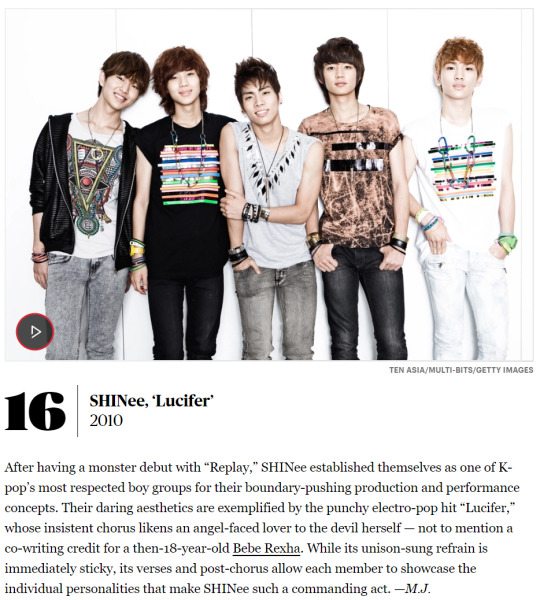
#Thought Sherlock should also be on this list#but I am a little biased#Billboard#The 100 Greatest Songs in the History of Korean Pop Music#SHINee#Lucifer#Taemin#Move
14 notes
·
View notes
Text
Rolling Stones selected SHINee's Lucifer & TAEMIN'S MOVE in their TOP 100 Greatest Songs in KPOP history.
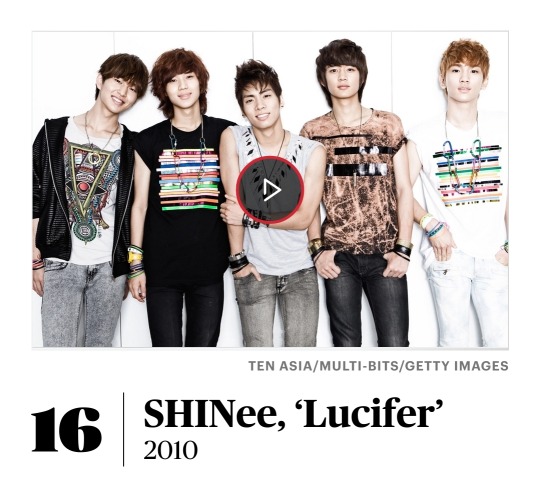
After having a monster debut with “Replay,” SHINee established themselves as one of K-pop’s most respected boy groups for their boundary-pushing production and performance concepts. Their daring aesthetics are exemplified by the punchy electro-pop hit “Lucifer,” whose insistent chorus likens an angel-faced lover to the devil herself — not to mention a co-writing credit for a then-18-year-old Bebe Rexha. While its unison-sung refrain is immediately sticky, its verses and post-chorus allow each member to showcase the individual personalities that make SHINee such a commanding act. —M.J.

Having already made an impact as the wunderkind of forward-thinking boy group SHINee, Taemin opened doors for androgynous expression in K-pop with his 2017 solo single, “Move.” Combining Eighties New Wave synths with sensual R&B melodies, the pulsating track captures delicately shifting dynamics between lovers. “Your elegant gestures/your subtle gaze,” he whisper-sings, building a sense of enigmatic seduction. These phrases were set to moves by choreographer Koharu Sugawara that are equally fluid; Taemin said his intention was to “[mix] both feminine and masculine movements together.” Though the song wasn’t a commercial smash, its genderless choreography became a sensation among idols and dancers, and it remains iconic for its alternative representation of sexuality. —M.H.K.
#230720#daily update#articles#eng#shinee#ot5#hard era#onew#lee jinki#jinki#kim jonghyun#jonghyun#kim kibum#kibum#key#minho#choi minho#lee taemin#taemin#shinee praise
63 notes
·
View notes
Text
The 100 Greatest Songs in the History of Korean Pop Music article
RollingStone has included Move and Lucifer in their list of the greatest songs in the history of Korean pop music.
#16 Lucifer
#86 Move cr.
(Taemin is the only SM soloist in this list 🎉)
32 notes
·
View notes
Text
Rolling Stone ‘The 100 Greatest Songs in the History of Korean Pop Music’
#16: Lucifer (SHINee) - After having a monster debut with ‘Replay,’ SHINee established themselves as one of K-pop’s most respected boy groups for their boundary-pushing production and performance concepts. Their daring aesthetics are exemplified by the punchy electro-pop hit ‘Lucifer’, Whose insistent chorus likens an angel-faced lover to the devil herself– not to mention a cowriting credit for a then-18-year-old Bebe Rexha. While it’s unison-sung refrain is immediately sticky, it’s verses and post-chorus allow each member to showcase the individual personalities that make SHINee such a commanding act. –M.J
#86: Move (TAEMIN)- Having already made an impact as the wunderkind of forward-thinking boy group SHINee, Taemin opened doors for the androgynous expression in K-pop with his 2017 solo single, “Move.” Combining Eighties New Wave synths with sensual R&B melodies, the pulsating track captures delicately shifting dynamics between lovers. “Your elegant gestures/your subtle gaze,” he whisper-sings, building a sense of enigmatic seduction. These phrases were set to moves by choreographer Koharu Sugawara that are equally fluid; Taemin said his intention was to “[mix] both feminine and masculine movements together.” though the song wasn’t a commercial smash, its genderless choreography became a sensation among idols and dancers, and it remains icons for its alternative representation of sexuality. –M.H.K
#shinee#onew#jonghyun#key#minho#taemin#230720#articles#infos#e:hard#tm:mentions#tm:articles#tm:hard#move#bebe rexha#lucifer
11 notes
·
View notes
Text
I contributed to 10 reviews for Rolling Stone's 100 Greatest Songs in the History of Korean Pop Music list. All of the participating music critics were asked to send in their top selections. From there, the editors had the difficult job of paring our choices down to just 100. My reviews include two hits by BTS, as well as songs by PSY, Monsta X, Super Junior, Epik High, Yoo Jae-ha, the Kim Sisters, Rain and Lee Nam-young.
I had quite a few selections that didn't make it in, including songs by Ateez and The Rose.
#Rolling Stone#BTS#PSY#Monsta X#Super Junior#Epik High#Yoo Jae-ha#Kim Sisters#Rain#Lee Nam-young#Best of list#Kpop
8 notes
·
View notes
Text
shine was featured in rolling stone’s 100 greatest songs in the history of korean pop music!
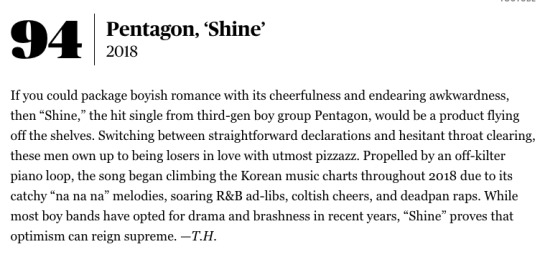
6 notes
·
View notes
Text
EXO's Growl has been ranked number 34 on Rolling Stone's The 100 Greatest Songs in the History of Korean Pop Music list!
Keep reading
3 notes
·
View notes
Note
I’m surprised super junior sorry sorry wasn’t in the top 10 list that shit was everywhere
Sorry, Sorry was super popular back in the day but I would argue that it's still not SuJu's best song. it's on No. 12 on the list, tho! here's the full article if you want take a peek: The 100 Greatest Songs in the History of Korean Pop Music
I have no idea the criteria they used, but this is apparently how they came up with the list:

like, hmm very questionable. all I'm gonna say is that I should've been in on that ballot and debate! lol
2 notes
·
View notes
Text
BTS Jin, Top 9 Most Influential Influencers in the U.S.
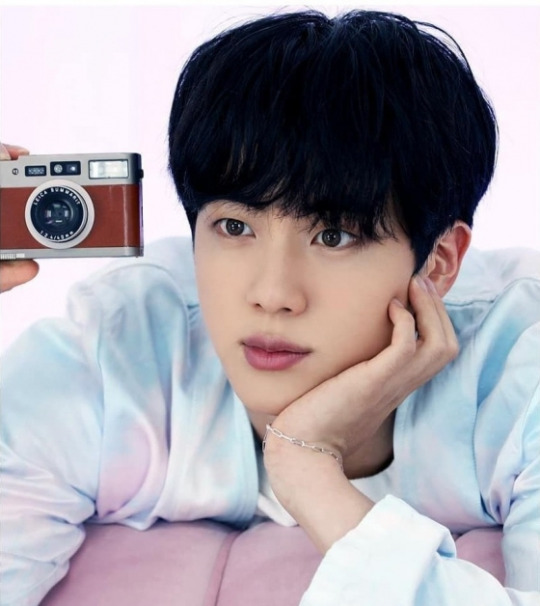
BTS' Jin gained popularity by taking the top spot among Asian males in 'America's Most Influential Influencer'.
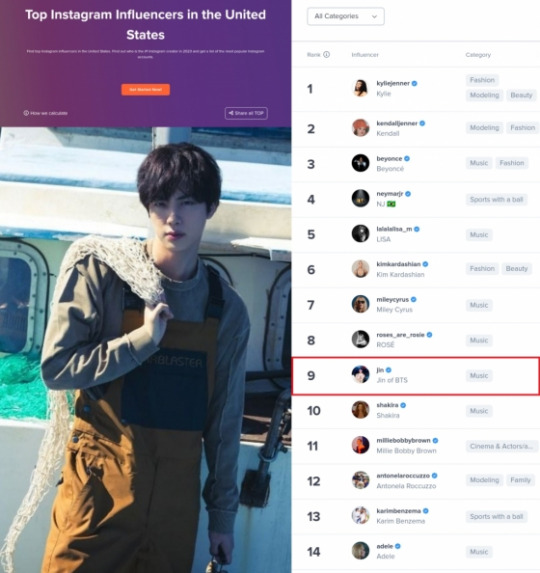
On March 12, Jin was ranked 9th in the 'Top 1000 Most Influential Influencers in America' announced by the influencer marketing platform HypeAuditor. This is the highest ranking among Asian men and the second highest ranking among men worldwide.
On the same chart, Jin also took first place in Asia for 24 consecutive days from March 22 last year and 107 consecutive days from October 3 of last year. Despite her military white flag, she also wrote a great record with a strong influence in the United States.
Jin, the only BTS member ranked in the TOP 50, showed off his hot popularity along with the most famous artists and celebrities Miley Cyrus, Shakira, and Adele.
Jin ranked 14th in the 'Top 1000 Most Influential Influencers in the World' announced on the same day, the highest among male celebrities in the world.
Hype Auditor classifies followers presumed to be fake in a specific person's Instagram account with an AI algorithm, analyzes the ranking of influential influencers, and provides services for brands or agencies to utilize.
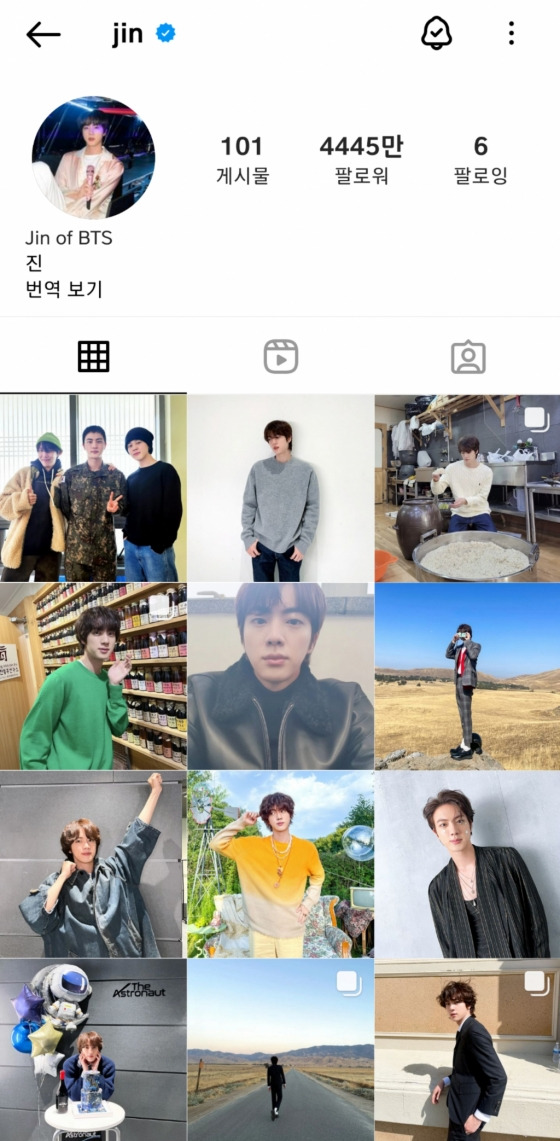
Jin, who started his personal Instagram account on December 6, 2021, has been ranked high for a long time despite the fact that it was opened later than other celebrities, and boasted extreme popularity and power even in the United States, where the best superstars around the world gather.
Even to those who see it for the first time, the question "Who has that outstanding appearance?" is flooded, and Jin's splendid beauty, called the 'god of beauty', always attracts attention. Jin's Instagram, the top vocalist who is receiving tremendous love from all over the world, is also enjoying explosive popularity. Jin's Instagram continues to grow despite uploading few posts due to her enlistment in the army, recording 44.45 million followers as of the morning of March 13th.

On the 4th, a photo taken with members J-Hope and Jimin was posted on Jin's Instagram with the words "Welcome". The members came to visit and showed their unchanging warm friendship. The short-cropped hair and the sculpture-like beauty of Jin despite the bare face became a hot topic.

This news was also highlighted by major foreign media such as Billboard, Rolling Stone, 'Inquirer', 'TIMES NOW', 'Clout News', and 'GMA News'.

On December 22, 2022, on social media announced by the US social media analysis company and consumer market information platform 'NetBase Quid', Jin was ranked as the '2022 Most Mentioned Artist' TOP2 and one of the solo artists. have topped
Despite his enlistment, he was ranked in the top 3 and top 2 among solo artists in the 'World's Most Mentioned Artists' released on February 25, recording 20 consecutive months of chart-in, making him the world's first artist and the longest chart ever. Making history as a human being, he realized Jin's powerful topicality and popularity. Since the launch of her Netbase Quid Chart, Jin has set a record of posting her name without missing a beat.
Founded in 2004, Netbase Quid analyzes the impact of consumer-led decision making for companies such as Coca-Cola, Hyundai, American Airlines, United Airlines, Microsoft and Walmart.
Jin ranked first as the most mentioned artist among male individuals in the world at the Grammy Awards in April of last year and the most mentioned person at the Billboard Music Awards (BBMAs) last year. It won first place a total of four times, including first place in March and July of the year before last, demonstrating its greatest influence and popularity.
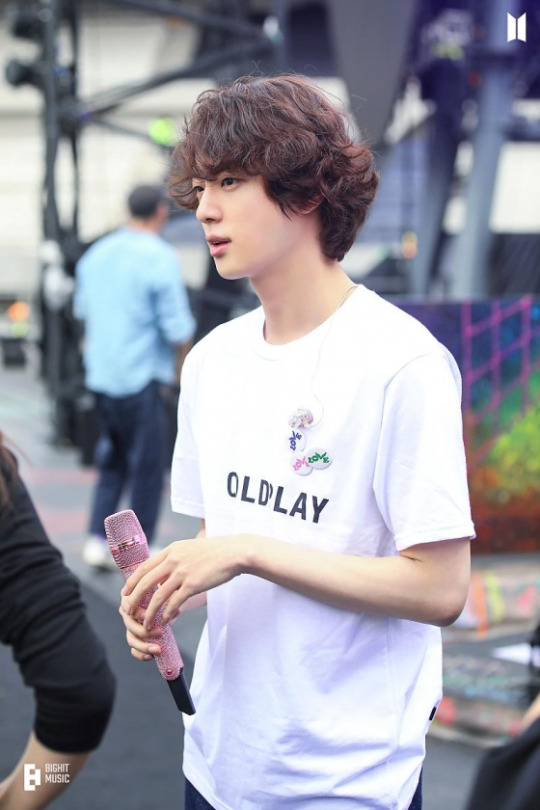
Jin's first solo single 'The Astronaut', released on October 28 last year, is the second Korean solo song on the US 'Billboard Hot 100', after Psy's 'Gentleman'. It debuted at a high rank and set new records on charts around the world. It was selected as 14th in 'The 25 Best K-Pop Songs of 2022: Staff Picks' by Billboard officials, and Jin took the top spot as a male solo singer.
'The Astronaut' was selected at number 68 on the '100 Best Songs of the Year' by American music magazine Rolling Stone, and Jin was ranked the highest among Asian soloists, and French media Paris Match ranked 'The Astronaut' ranked 4th in 'Top 10 Best K-Pop Songs of 2022', Jin took the top spot among male soloists, proving his outstanding musicality and dazzling talent.
Source: Star News Korea
3 notes
·
View notes
Text
#lmao no. 1 xD#I'd argue with some but im so glad infinite and gfriend made it to the list#no oh my girl tho shocking#no fantastic baby? no mr simple? no apinks no no no?#some old korean songs worth checking out#music history#blah blah
0 notes
Text
https://www.rollingstone.com/music/music-lists/best-korean-pop-songs-1234727955/
0 notes
Text
svt was featured on rolling stone’s list of 100 greatest songs in korean pop music history (ft a woozi shoutout)!
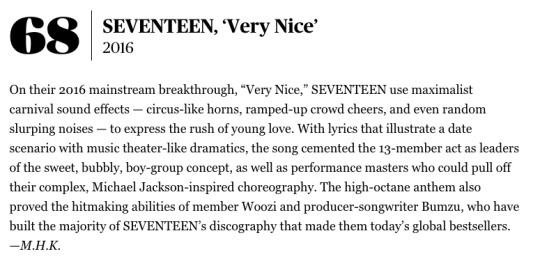
#obv this list is not law i was just very excited to see svt mentioned!!! <3#actually there were so many artists i was happy to see on there!!!!#great day for me (still sing gee to myself around the house in 2023)
0 notes
Text
Artist Highlight - Park Jimin

Name: Park Jimin
Born: October 13, 1995
Park Jimin is a 26 year old South Korean singer from the famous K-pop boy band by the name of BTS. Jimin's main role in the group is vocalist and dancer. In the South Korean city of Busan's Geumjeong District, Jimin was born on October 13, 1995. His mother, father, and younger brother make up his immediate family. He went to Yonsgan Middle School and Hodong Elementary School in Busan when he was younger. He studied hip hop dance at the Just Dance Academy during middle school. Jimin was a top student in the modern dance division at Busan High School of Arts when she studied contemporary dance before becoming a trainee. He found Big Hit Entertainment when an instructor advised him to go on an audition with an entertainment business. He transferred to Korean Arts High School after passing the auditions in 2012 and graduated in 2014. Jimin earned a degree in Broadcasting and Entertainment from Global Cyber University in August 2020. He began studying for a Master of Business Administration in Advertising and Media in 2021 at Hanyang Cyber University.
Jimin's singing has been compared to being soft and lovely. Among the group's members and in K-pop in general, he is considered as an amazing dancer. He is frequently lauded for his "smooth and beautiful motions" as well as his charm on stage, according to Noelle Devoe of Elite Daily. Jimin claimed in the BTS documentary Burn The Stage that he views himself as a perfectionist and that even the smallest faults on stage cause him anguish and remorse.
When the song "No More Dream", one of my personal favorites, was released on June 13, 2013, Jimin officially joined BTS. He has three solo songs under BTS called "Lie," "Serendipity," and "Filter." The song "Lie" was characterized as magnificent and dramatic, expressing melancholy undertones and feelings. I have seen the "Lie" performance live on many different occasions and I must say that it is one of my favorite solos from Jimin and that it is a true work of art. I could have the song on repeat for days. On the other hand, "Serendipity," was gentle and sensual, revealing the joy, conviction, and wonder of love. The thing I love most about this song is the music video. Jimin looks so majestic in this music video and the songs soft soothing theme makes it easy to listen to when lying in bed. The song "Filter," was very different from the Jimin's previous effort. It had a distinct Latin pop flare with lyrics that discussed the various aspects of Jimin that he presents to others and to the world. This song completely caught me by surprise because I have never heard anything like this from Jimin before but I really love the song and the live performances of this song are amazing.
In 2018, "Serendipity" and "Lie" both topped fifty million Spotify streams. Jimin became the first Korean musician to have three solo songs receive more than 50 million streams each when he did this. With "Serendipity," Jimin became the first member of BTS to have a solo music video receive 100 million views on YouTube. In total, it was the nineteenth BTS music video to accomplish the feat. With over 2.2 million streams in the first 24 hours of release in February, "Filter" broke the previous record for the greatest streaming debut among all Korean songs on Spotify. It also became the fastest Korean solo to cross 20-60 million streams in the platform's history. Additionally, it is the first and only solo BTS song to be nominated for Song of the Year at the Gaon Chart Music Awards. "Filter" is BTS' 15th song to spend an entire year at the top of the Billboard World Digital Song Sales list as of March 2021.
1 note
·
View note
Text
BTS Named Billboard’s “The Greatest Pop Star Of 2020,” Joining Madonna And Michael Jackson On Star-Studded List Stretching Back To 1981
Billboard has officially added BTS to their decades-long list of “The Greatest Pop Star of Every Year”!
This week, Billboard named BTS “The Greatest Pop Star of 2020,” continuing its tradition of designating a pop star that shone especially bright for each year.
BTS joins a list of legendary singers that goes all the way back to 1981 and includes artists like Michael Jackson, Madonna, Whitney Houston, Mariah Carey, Nirvana, Backstreet Boys, Britney Spears, Kanye West, Eminem, Beyoncé, Justin Timberlake, Rihanna, Lady Gaga, Adele, Taylor Swift, Justin Bieber, Ed Sheeran, Drake, and Ariana Grande.
For its latest addition to the list, Billboard highlighted BTS’s many historic achievements in 2020, including becoming the first Korean artist ever to score a Grammy Awards nomination (for their smash hit “Dynamite,” which was the first song by an all-Korean group to hit No. 1 on Billboard’s Hot 100). BTS also made history on the Billboard charts when their latest title track “Life Goes On” debuted at No. 1 on the Hot 100, making it the first track sung primarily in Korean ever to top the chart.
Mia Nazareno wrote, “It’s impossible to ignore that BTS is the first Asian artist to appear on this list alongside undeniable, no-questions-asked English-language superstars. While non-English works of art are often sidelined into ‘foreign’ categories, this level of recognition for a predominantly Korean-language band from Western media—the group was even named 2020 Entertainer of the Year by TIME—feels like a changing of the guard at the gates of American top 40.”
“With each milestone and new No. 1 in 2020, BTS made it harder for U.S. audiences to deny not only the group’s own supreme superstardom, but also K-pop’s much-deserved place in mainstream music,” she continued. “And now that we’re finally listening, it pains us to imagine all the potential pop classics we missed out on simply because of the language barrier between us.”
Congratulations to BTS!
Source
298 notes
·
View notes
Link
On a modest stage inside a tent in downtown Los Angeles, the four members of the South Korean girl group Blackpink assume a diamond formation and aim their fingers like guns at the audience as they launch into the chorus of their breakout hit, “Ddu-du Ddu-du”: “Wait till I do what I ... Hit you with that ddu-du ddu-du du!”
It’s the afternoon before the Grammys at Universal Music Group chairman/CEO Lucian Grainge’s annual showcase, where he presents the company’s prospective superstars to a crowd of record executives and industry types. (Past performers have included Ariana Grande, Halsey and Shawn Mendes.) With their intense choreography, dance-heavy beats and Clueless-esque high-fashion looks, the four women offer the kind of bells-and-whistles pop production that makes them an anomaly not just on today’s lineup, where rappers like 2 Chainz and Lil Baby abound, but also on the charts, where women like Grande serve up their divadom with an extra dose of realness.
The showcase marks Blackpink’s first stateside performance, though the band made history long before: “Ddu-du Ddu-du” became the highest-charting single by a Korean girl group on the Billboard Hot 100 when it peaked at No. 55 last June, and this April the act will be the first Korean girl group to play Coachella, before embarking on a North American arena tour. “Ddu-du Ddu-du,” sung mostly in Korean, is a boastful warning to those who underestimate Blackpink, with a hook (meant to imitate the sound of bullets flying) that’s also a canny invitation to non-Korean listeners -- anyone can sing the words. The buttoned-up UMG crowd seems a little unsure, but also intrigued: Just as Blackpink’s Jennie -- soft-spoken in person, but onstage a fierce singer and rapper -- slides into a rat-tat-tat flow in the second verse, more and more audience members whip out their phones to capture video.
There’s no longer any question that K-pop is happening in America. BTS, the seven-member South Korean boy band, scored two No. 1 albums on the Billboard 200 in 2018 and became the first K-pop group to sell out an American stadium when it played New York’s Citi Field in October. Yet despite the group’s visibility here, K-pop remains somewhat detached from the mainstream: It receives relatively little top 40 airplay despite fan-army pressure on radio stations, its artists rarely tour with non-K-pop acts, and outside of its intensely passionate fan groups, K-pop stars hardly drive the wider “conversation” that someone like Grande can dominate with a single tweet.
Blackpink represents Korean music’s latest, greatest hope at breaking out of the American K-pop box. The group believes its multinational identity gives it global appeal: Sweet-voiced Jisoo, 24, is a South Korean native; buoyant rapper Lisa, 21, is from Thailand; guitar-playing Rosé, 22, grew up in Australia; and Jennie, 23, was born in South Korea but spent some formative years in New Zealand. “You don’t have to understand Korean to understand the music, the visuals, the vibe,” says Jisoo, through a translator. (Rosé and Jennie are fluent in English; Lisa alternates between English and Korean during our interview.) “We’ve got so much Korean culture and so much Western culture in us,” adds Rosé, her Australian accent still pronounced.
And though occasional English lyrics already pepper their tracks, Jennie notes that recording all-English songs is something they “definitely want to do” in the future. (They’re focused on making their debut album first.) Even their sound -- an omnivorous fusion of fist-pumping EDM and booming hip-hop beats with flashes of house, ’80s pop and harmonica-driven folk -- seems conceived for the widest possible audience. “I was immediately drawn to their fierce and empowering energy,” says Dua Lipa, who asked the group to guest on last year’s bilingual banger “Kiss and Make Up.” “They are not just giving you hit songs -- they are sending a message that resonates beyond the lyrics.”
Last fall, Blackpink signed to Interscope Records, which will serve as both a creative and business partner to YG Entertainment, the group’s Korean home and one of South Korea’s three main music companies along with SM Entertainment and JYP Entertainment. These companies serve as label, management firm and production studio, controlling almost every aspect of their artists’ careers. Interscope chairman/CEO John Janick says that YG’s leadership -- Hyunsuk “YG” Yang, its founder, and Teddy Park, Blackpink’s main producer and creative director -- “runs the show,” but the relationship is collaborative: Sam Riback, Interscope’s pop-rock A&R head, has made multiple trips to YG’s Seoul headquarters and “has been sending them lots of different ideas,” according to Janick. “Our goal,” he says, “is to amplify what YG has been doing globally.”
If Interscope can help turn Blackpink into a truly global superstar act, the partnership could become a model for other labels looking to invest in K-pop and even pave the way for joint imprints. “This deal could be a benchmark,” says YG’s Joojong “JJ” Joe, who heads the company’s U.S. operations from a small house near Los Angeles’ Echo Park. It will also confirm Interscope’s foresight about K-pop. In 2011, the label signed the group Girls’ Generation during one of the earlier waves of K-pop imports, when artists like BoA and Wonder Girls worked with Western producers and companies.
At the time, those artists barely made a dent on the mainstream charts, and their backers took a hit: Despite high-profile promotional appearances, Girls’ Generation’sThe Boys LP sold only 1,000 copies in the United States during its first week in 2012, according to Nielsen Music. Since then, however, streaming platforms have made it easier for fans to discover and support Korean music, while the growth of social media has also allowed them to forge deep connections with artists everywhere. “In this era, people find their music and their talented artists on the internet,” says Susan Rosenbluth, senior vp at AEG Presents/Goldenvoice, who helped book Blackpink’s North American tour and notes that K-pop’s stateside audience “does not follow along ethnic lines.”
To Janick, the success of Luis Fonsi and Daddy Yankee’s chart-topping Latin hit, “Despacito,” aided by a Justin Bieber remix, made English-speaking listeners more open-minded in general to music in other languages. “We’re going to have hits from all different territories -- more of them, and more often than we’ve seen in the past,” he says.
But the onus isn’t just on listeners to embrace Korean music -- it’s on industry gatekeepers too. At the UMG showcase, the reaction to Blackpink is enthusiastic, but it feels muted compared with the rousing ovation the crowd gives classic-rock revivalists Greta Van Fleet, whose 2018 debut album was notoriously panned by some critics as derivative. The response to Blackpink’s Interscope deal, however, suggests that attitude could change.
“So many artists on our roster started calling, saying, ‘I want to work with these girls.’ Radio stations were asking when new music was going to be out,” says Interscope executive vp business development Jeremy Erlich, who facilitated early conversations between the label and YG (he and Joe attended business school together). “The industry’s ready. When the music comes out, I don’t think there’s going to be many people saying, ‘This is just a fad.’”
The day before the showcase, the ladies of Blackpink are ensconced in a hotel suite high above downtown L.A. Lisa, dressed in a gray fleece and a checkered coat, spies the Hollywood sign through a corner window and bounds off a couch for a closer look. Her bandmates, cozied up in brightly colored sweatshirts and cardigans, admit they weren’t expecting Los Angeles in February to be so chilly. During some rare downtime the previous day, they went shopping in Santa Monica. “It was supposed to be for fashion,” says Jennie, “but we ended up just grabbing anything that was warm.”
This is Blackpink’s first trip to L.A., but it has been almost a decade in the making. The group’s members came to Seoul from all over the world starting in 2010 to take part in YG’s rigorous recruitment and training process. The company and its competitors hold tryouts both within and far beyond Korea (Rosé traveled to Sydney from her home in Melbourne), seeking recruits who are typically preteens or teens, ethnically Korean and fluent in the language, though these qualities are not mandatory. Lisa, who auditioned in her native Thailand in 2010, didn’t speak any Korean when she began training in Seoul in 2011.
For all four women, joining YG meant enrolling in a kind of full-time pop-star academy that Jennie calls “more strict than school” and that Rosé likens to The X Factor with dorm rooms. For 12 hours a day, seven days a week, the future members of Blackpink -- along with, by Jennie’s estimate, 10-20 other aspiring singers who cycled through the project -- studied singing, dancing and rapping, taking part in monthly tests designed to identify their strengths and weed out subpar trainees. “Somebody would come in with a piece of paper and stick it on a wall, and it would say who did best, who did worst, who’s going home,” recalls Jennie, whom YG initially steered toward rapping because she spoke fluent English. “You get a score -- A, B, C,” Lisa explains. “Lisa would always get A’s for everything,” adds Jennie with a laugh.
The process was lengthy. Before Blackpink debuted in 2016, Jennie spent six years in training, Lisa and Jisoo five and Rosé four. For the members who had left behind life outside South Korea, the pace of training on top of the culture shock was sometimes tough. “I’d call my parents crying,” recalls Rosé. “But as much as it was hard for me to cope with all of that, it made me more hungry. I remember my mom would be like, ‘If it’s so hard for you, just come back home.’ But I’d be like” -- she mimics a surly teen’s glare, much to the others’ amusement -- “‘That’s not what I’m talking about!’” Lisa credits her future bandmates with easing her transition. “Jennie would speak English to me, and Jisoo helped me out with my Korean,” she says. Rosé was the last of the bunch to enter training, but she remembers the four of them bonding during an all-night jam session when she arrived. “We just clicked,” she says.
That’s clearly still the case: Rosé sometimes puts her hand on Lisa’s knee when translating for her, and at one point Jennie and Jisoo huddle close together to silently adjust one of their necklaces, displaying the intimacy of close friends. “We don’t really have a day off,” says Lisa. (Once every two weeks, Rosé clarifies.) And because their families are so far-flung, they often spend their time off with each other anyway. “We’re stuck together,” says Rosé, laughing.
While K-pop companies have a reputation for packaging groups assembly line-style, Blackpink’s members insist they have plenty of creative input, despite having no official writing credits on their tracks. Park plays them music he’s working on and “really tries to put our thoughts into our songs,” says Jennie. “He really gets his inspirations from us.”
“It’s important as recording artists that they actually truly own their songs,” says Park. The women all make suggestions about who should sing what, and if a part doesn’t feel right to someone, he will make adjustments. “He doesn’t just bring us a song, like, ‘Go practice,’” says Rosé.
Besides, the members of Blackpink have another creative outlet: Last fall, YG announced that they would all release solo material, starting with Jennie, whose debut single, “Solo,” topped Billboard’s World Digital Song Sales chart in December. Though the music is still created and put out by YG, the idea that group longevity and solo success aren’t mutually exclusive is a radical development in girl-group history -- one that Janick says only “makes the brand stronger.”
Stars who come through companies like YG are called “idols” in Korea and have historically been expected to maintain a squeaky-clean image. When Blackpink debuted, Jennie says YG was very selective about its promotional appearances: “We were trained to be a little more...” “Closed in?” Rosé suggests.
“Closed in” is exactly what the outspoken women ruling the U.S. charts now, from Grande to Halsey, are not -- they make deeply personal, even raw, music. But while Blackpink may well find success catering to an audience craving its kind of TRL-era pop spectacle -- Interscope’s Erlich calls the group “the modern Spice Girls” -- lately the band has been less concerned with appearing perfect, both onstage and off. “We always wanted to be out there, to be more true to ourselves and a little more free,” says Jennie. “Even we can get things wrong sometimes. We want to just show them the real us.”
Jennie and Lisa do just that when I ask how they expect to be received as rappers in America. Lisa lets out an embarrassed groan, withdrawing into her fleece. She has loved hip-hop since childhood and is obsessed with Tyga (“I love his swag,” she says, blushing). But she and Jennie seem well aware that a group of Asian women adopting a style pioneered by black American artists might be a hard sell for some stateside listeners who are keenly attuned to debates about cultural appropriation.
“Me and Lisa don’t talk about it out loud, but I know we have this big pressure,” says Jennie, who adds that she studied artists like Lauryn Hill and TLC when she first started rapping. She looks across the room at Lisa: “She’s going to kill it.” Lisa just scrunches up her face.
That kind of vulnerability may be what ultimately endears Blackpink to an American pop audience. “The artists that are the most successful in these situations are really authentic with how they can relate to a coming-of-age experience” in their music, says Goldenvoice’s Rosenbluth. “There’s a certain amount of authenticity to Blackpink that I really love. The dedication is heartfelt.”
Back at the showcase, the band finishes its set with the reggaetón-tinged “Forever Young,” featuring an intricately choreographed, hair-flipping dance break. As the beat reaches its booming climax, the bandmembers whip toward each other and strike a statuesque pose with their hands on their hips, just in time for the music to stop. They hold still for a moment as the lights dim, then drop their arms and turn toward each other, catching their breath and grinning like four young women who can’t quite believe they’re here.
106 notes
·
View notes
Text
Why BTS deserve a Nobel Prize (And what you can do to make it happen)
Hello fellow ARMYs! A very close friend of mine wrote something beautiful to express her gratitude towards BTS. Her idea is to nominate them for the Nobel Peace Prize, which, in my opinion, they really deserve. Thank you, Katie, for creating such a kind-hearted and beautiful thing, for coming up with this amazing idea and for expressing your thoughts and feelings so well!
Please stop by and read this. It’s worth it, I promise. Thank you in advance!
Nobel Peace Prize Nomination Process

This past year has been more war-torn than any I can recall, so I don't envy the people in charge of selecting the Nobel Peace Prize. The 2018 Prize was lost in the second American civil war between the media and the president, a casualty of the wholly unsurprising scandals that dominate headlines. Very few people in the public eye have made contributions towards peace, with more focus being placed on school shootings, terrorism, and the ongoing cold war of our time.
I will not address these issues here.
What I would like to offer is a suggestion for the 2019 Nobel Peace prize that many people might overlook while we are distracted by the dramatic news headlines, senseless violence, and political deterioration in America. In general, South Korea has done the most for peace this year, also conducting themselves with far more discretion than America. But which Korean has helped most people? Thinking on the news from recently, the first that come to mind are the South Korean soldiers who risked their lives to save the North Korean defector as he was shot at by his comrades. The South Korean president, Moon, has also been mentioned a few times. These men, while deserving of recognition and respect, are not as accessible to the world as the candidates I will suggest.
Music and it's ability to overcome obstacles is still something of a mystery. One of the few positive images I recall from the news this year was a young autistic boy who couldn't speak, but when his sister played guitar he could sing lyrics. Music has the capacity to transcend time, culture, race, education and (maybe the greatest obstacle to peace) language.
South Korea has gained attention lately for their variety of Pop, dominating charts in places that don't even commonly teach how to say "hello" in Korean. Despite stark cultural differences, westerners are beginning to embrace the music from South Korea. Though the K-pop industry is fairly shameless about the inclusion of physically attractive members to garner interest and income (particularly when the target audience doesn't necessarily speak Korean), the musicians in "visual" roles themselves tend to have a patient sense of humor about being objectified. The oldest member of the Korean boyband BTS in particular loves to deadpan to vapid American interviewers that his best feature is "my handsome face". And he's talked to quite a few of those over the past few years, because BTS is breaking records all over the world.
"Army" is the name their fans go by, in reference to the band's Korean name, which translates to "bulletproof boyscouts". The fanbase is fiercly loyal and protective, and like the visible fans of The Beatles and N*Sync were during their heyday, they are predominantly young girls.
The band members themselves - known to the public as RM, Jin, Suga, J-Hope, Jimin, V, and Jungkook - top the charts in unprecedented ways, recently making history by hitting 100 million YouTube views on their single "Fake Love" in a little over a week.
A considerable amount of the song is in English, particularly in the raps performed by 23-year-old Namjoon or "RM", who has mastered English's bizarrely intricate pronunciation and grammar better than the average young American and can hold a witty conversation with no foreign accent and only a slightly slower pace. The six other members, though still learning English at their own paces, are nonetheless enthusiastic about communicating with Army and are brave enough to endure the icy winds of western social judgement in order to speak to international fans who cannot speak Korean.
BTS has unified and rallied our youth far better than any political leader, and this truth is evident in their widespread success. Google their name if you doubt it. Which brings me back to the issue of the Nobel Peace recipients - as well as the Eastern deference to ancient ideals like honor and tradition. To celebrate the quiet effort South Korea has made towards peace with North Korea and the United States, to salute the eastern prioritization of peace above power, and to value the capacity of these seven young men to NOT perpetuate violence or drama, I think BTS and their contributions to both the music industry and their endless effort to connect with their many young fans all over the world are most deserving of the Nobel Peace Prize.
World peace is not about the older generations, it is about the young people who will invariably lose their lives if peace is disregarded. South Korean men, including young musicians, are subject to a mandatory military draft as a precaution against North Korean conflict. If Trump cannot be bothered to negotiate nuclear disarmament with North Korea and the South Korean government goes to war, it will mean sending in young men that might have otherwise made music that heals people all over the world, because South Koreans do not have the luxury of doing whatever makes them happy with no consequences.
I've only recently become army; I do not have a favorite member or a favorite song. I am not delusional or so young that I am blinded by hormones. I am simply an American woman who had the opportunity to observe and interact with other human beings. I have felt the consequences of my own choices and the choices others made. This is who I respect the most this year.

#bts#kim seokjin#jin#min yoongi#min suga#suga#jung hoseok#j-hope#jhope#hobi#kim namjoon#namjoon#rm#park jimin#jimin#kim taehyung#taehyung#tae#v#jeon jungkook#jungkook#kookie#nobel prize#nobel peace prize#bangtan sonyeondan#bangtan boys#bulletproof boys#bulletproof boy scouts#kpop#ARMY
9 notes
·
View notes